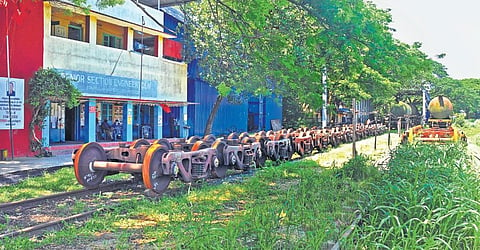

KOCHI: State Pollution Control Board (PCB), Ernakulam, is set to take action against the “improper treatment of bio-toilet effluents” at the railway marshalling yard in Ponnurunni.
According to the authorities, sewage from the bio-toilet facilities is contaminating the water bodies with high levels of faecal bacteria and the yard does not follow the quality standards of PCB.
“There are no facilities in the yard to conduct proper sewage treatment. Effluents from toilets are being disposed off directly into a pit. The overflowing pit carries the improperly treated sewage into the water bodies through drains, contaminating them with high levels of faecal bacteria,” said a PCB official.
PCB had initially sought an explanation from the Railways and received a response, which they claimed was unsatisfactory. “In their response, the Railways claimed that they treat the sewage using the DRDO (defence research and development organisation) technology. That does not explain why they failed to follow the PCB standards,” PCB said.
The bio-toilet facility in DRDO standards uses Anaerobic Microbial Inoculum (AMI Bacteria) to decompose the toilet waste. The AMI Bacteria reduces 90-95% of the solid waste by decomposing it into bio-gas and liquid. The liquid effluent can then be drained from the trains to any surface or soak pits (at a distance of 4 to 5 ft from a bio-digester tank) without any environmental hazards.
However, according to PCB, the effluents should be treated further to minimise the microbial levels for them to be safe for emptying into water bodies. “For example, the level of coliform bacteria should be less than 230 units before being released to water bodies which is 10^6 higher in the sewage left untreated by the Railways. PCB had notified the issue once to the Railways, but as satisfactory responses were not received, we are going for further action,” said the official.
On the other hand, the Railways claimed that the allegations were baseless. “The allegations are incorrect and are coming out of a lack of knowledge about the system of bio-toilets. This is the standard sewage treatment plan practiced by the Indian Railways all over the country,” said Manish Thaplayal, division railway manager.
“Similar issues were raised in Thiruvananthapuram as well, but got resolved as they tried to understand how a bio-toilet system works,” he added.